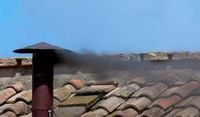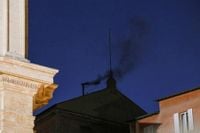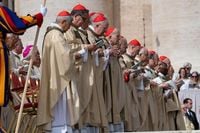The Vatican is ablaze with controversy as the highly anticipated conclave to elect the next pope kicks off amidst a backdrop of intense lobbying, scandal, and intrigue. In a gripping display of power and secrecy, 133 cardinals entered the Sistine Chapel on Wednesday afternoon, May 7, 2025, for the sacred ritual. The atmosphere was tense as the cardinals took their oath of secrecy under the watchful eyes of Michelangelo’s iconic frescoes. As the world watched with bated breath, the first round of voting began, resulting in black smoke billowing from the chimney, signaling an inconclusive ballot. The suspense only intensified as the global Church grappled with deep-seated disagreements, particularly regarding progressivism and tradition.
Names of potential frontrunners emerged, with figures like Cardinal Mario Grech and Cardinal Robert Prevost gaining traction as candidates to lead the Church into a new era. These individuals represented different visions for the future of Catholicism, from greater inclusivity to bridging ideological divides. However, the road to the papacy is fraught with challenges and obstacles, as seen in the case of Pietro Parolin, whose candidacy faced skepticism and opposition from various quarters. The pre-conclave period was marked by unexpected twists and turns, including the withdrawal of Giovanni Angelo Becciu due to a scandal involving Vatican funds.
Even at this late stage, commentators remain uncertain as to who is most likely to be elected the next pope. Cardinal Pietro Parolin (70), seen as a continuity candidate, appeals to the more conservative members among the cardinal electors. He has been Vatican secretary of state for most of Francis’s papacy and has demurred at some of what some in the Church would consider Francis’s “extravagances,” such as authorizing blessings for same-sex couples in December 2023. In 2015, Parolin described the referendum in Ireland that allowed same-sex marriage as a “defeat for humanity.” His careful and measured style, however, may not resonate with all electors.
Cardinal Luis Antonio Tagle (67) from the Philippines is considered a more outgoing personality with an eye for the spotlight. Dubbed “the Asian Francis,” Tagle is seen as a strong contender among liberals within the Catholic Church. He enjoys karaoke and has a viral clip of him singing John Lennon’s "Imagine". While Tagle has solid ties to the United States and speaks good English, some in the American Catholic right perceive him as too liberal.
Another contender who might take everyone by surprise is Cardinal Matteo Zuppi (69), Archbishop of Bologna and president of the Italian Bishops’ Conference. Zuppi is often compared to Francis in his emphasis on mercy and outreach, especially for the poor and marginalized. He was appointed by Pope Francis to lead the Vatican diplomatic mission to ease tensions in the Ukraine conflict and has been described as genial and accessible.
Cardinal Mario Grech (68), from the tiny island of Gozo off Malta, has evolved from a more conservative background to align with Francis’s modernizing reforms. As secretary general of the Synod of Bishops, he has been central to the ongoing synodal process initiated by Pope Francis, positioning him uniquely among the papabili.
Cardinal Peter Turkson (75) from Ghana, the first cardinal from the African country, is also in the mix. He has extensive Vatican experience and a reputation for being strong on inter-religious dialogue. However, his age and the conservative nature of the African Church may hinder his chances.
Cardinal Fridolin Ambongo Besungu (65), Archbishop of Kinshasa in the Democratic Republic of Congo, is another name mentioned as a potential papabile. Known for his outspoken criticism of the Congolese government and his support of orthodoxy, Ambongo would be a notable figure if elected, as he would become the first African pope in over 1,500 years.
As the conclave unfolds behind closed doors, the world waits anxiously for the telltale sign of white smoke that will announce the election of the new pope. The stakes are high, and the outcome remains uncertain as the Church stands on the brink of a new chapter in its storied history. With so much at stake, the cardinal electors must navigate a complex web of politics, tradition, and the expectations of a global Catholic community eager for direction.
In the backdrop of this conclave, one thing is clear: the election of the next pope will not just be a matter of choosing a leader but will also reflect the values and priorities of the Catholic Church moving forward. The ongoing debates within the Church about inclusivity, morality, and the role of women will undoubtedly influence the discussions among the cardinals.
As we watch this historic moment unfold, the world is reminded that the papacy is not just a position of power but a role that carries immense responsibility. The next pope will have to address pressing global issues, from climate change to social justice, while also navigating the internal divisions that have come to characterize the Church under Pope Francis. The anticipation builds as the cardinals cast their votes, each one aware that their decision will shape the future of the Catholic Church for years to come.



